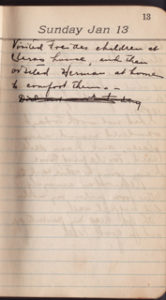
Attended meeting of our newly
organized camp of the order
Sons of Zion,
I’m glad that my motion
to call name our org, Maccabean
was passed although after a big battle.
I accepted the nomination
and Election of Master of Ceremonies
and I certainly will see to it
that all rituals be strictly
enforced.
[note: a continuation of the next day’s entry fills the bottom of this page]
—————————
Matt’s Notes
Looks like Papa was a member of a Jewish fraternal order, and presumably in his capacity as Master of Ceremonies he was the keeper of rituals and parliamentary procedures. At the moment I have no idea what they were up to (I’ve never joined any sort of order myself, though I am a member of the Film Forum at the $150 level) but I’m looking into it (and please chime in if you know anything about Jewish fraternal organizations). Papa’s account of a “big battle” over the group’s nickname hints at some organizational self-importance or frivolity, but I really I don’t think he’d be part of it unless it was somehow directed toward raising funds for a Jewish homeland, serving the labor movement or performing acts of charity.
Then again, maybe it was just a club. Papa was single, prone to sadness, and in only the 11th year of reconstructing his life from scratch in a burgeoning, indifferent city; he might have just wanted to go somewhere for a heated discussion every so often, to replace the people he had lost with a few manufactured “brothers,” to hedge against loneliness. He was just a human being, after all. I’ll need to remind myself of this as the year progresses, to view his journal not as a lost gospel but a sliver of a life, a look at a twenty-nine-year-old, a man younger than me, who had not yet become who he would be. As I mentioned previously, he has been an abstraction to me all these years, remembered more as a feeling than as a real person. To see him as fallible and real is, perhaps, another way to relate to him more closely, to put his example within reach.
Update
Shows you how much I know. The above meditation on relating to my grandfather still stands, but in poking around a little more I’ve learned that immigrant fraternal organizations cropped up all over the place in the late 19th and early 20th centuries. Fraternal societies played a big role in American life back then; for many immigrants, to join an order was a way to become in effect more American.1
Jewish immigrants formed plenty of their own orders, often geared toward community service (B’nai Brith is a well-known example, though until today I knew nothing of its fraternal origins). B’nai Zion, my grandfather’s order, was formed in 1908 and still operates today as a charitable organization. When Papa joined, they were certainly not frivolous — they helped provide life insurance to immigrants and were closely allied with Keren Hayesod. (For more, check out the B’nai Zion Web site). I’ve been in touch with them, so I’ll add updates as I learn more.
—————–
References for this post
1 – Soyer, Daniel, “Entering the ‘Tent of Abraham’: Fraternal Ritual and American-Jewish Identity, 1880-1920”, Religion and American Culture, Vol. 9, No. 2 (Summer, 1999), pp. 159-182

 10:30 a.m. Outside Montefiore Home
10:30 a.m. Outside Montefiore Home





 6:30 am Slept last night with
6:30 am Slept last night with


